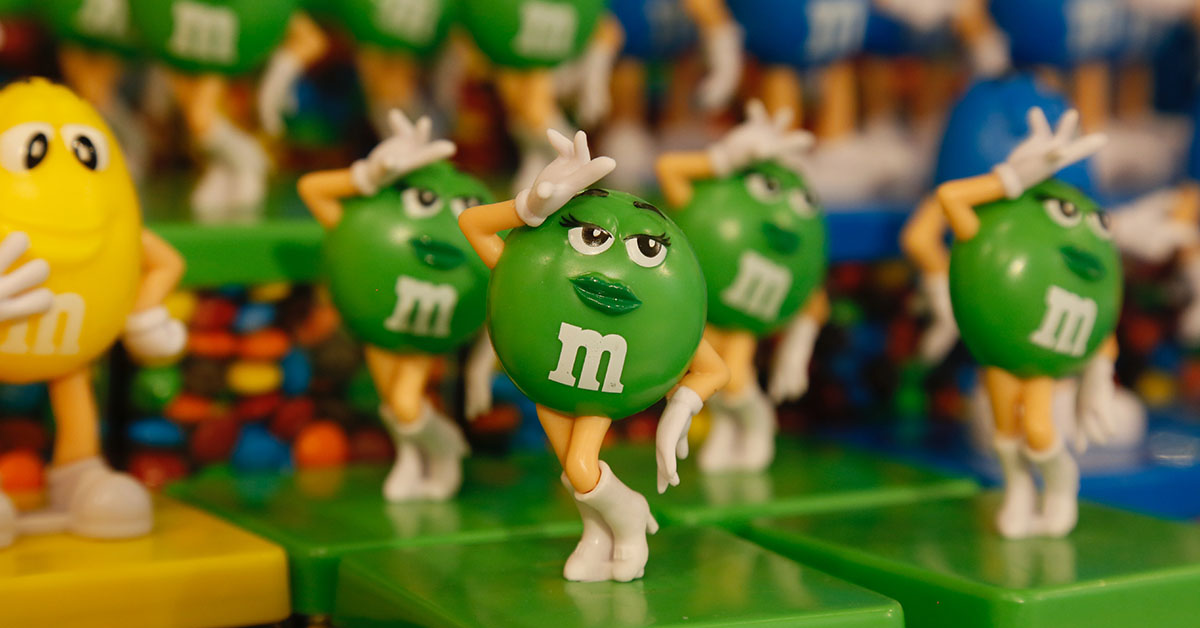Can a brand mascot be divisive?
It’s hard to know exactly what Mars Wrigley was thinking—or even what planet the confectionary conglomerate was on—when they announced a sartorial makeover of the six M&M’s “spokescandies” on the eve of last year’s Super Bowl. Their rationale for shelving them altogether last month is even harder to fathom.
The 2022 changes primarily involved the footwear of the brown and green candies, both females. Ms. Brown’s stilettos were boxed up and replaced with less punishing, more sensible heels; Ms. Green’s 1970-ish white disco boots were swapped out for low-top sneakers.
The sole effect was to make the sextet less sexy, which was seemingly Mars’ intention, although it’s hard to say for certain. “We believe that in the world we want tomorrow, society is inclusive,” the company explained. Sort of. “The refreshed M&M’S® brand will include a more modern take on the looks of our beloved characters, as well as more nuanced personalities.”
This happened in January 2022. Russia’s invasion of Ukraine was imminent. The pandemic held the planet in its grip. Gun violence was rampant. Climate change was outpacing projections. Who could possibly have been bothered by what a bunch of dancing candies were wearing on their feet? Who would have even noticed?
Lots of people, as it turned out. Some saw the fashion refresh as a diversionary tactic—a way of drawing attention away from a child labor lawsuit then pending against Mars and several other companies. A prominent right-wing news commentator bewailed the candies’ loss of feminine allure.
“M&M’s will not be satisfied until every last cartoon character is deeply unappealing and totally androgynous—until the moment when you wouldn’t want to have a drink with any one of them,” he said. Actually.
Fast forward one year: Nervous about being caught up in a lose-lose culture war, the company recently benched the entire mascot team and hired Maya Rudolph as its human, non-dancing celebrity spokesperson—a move no less baffling than the 2022 re-shoeing.
“America, let’s talk,” the company said. “In the last year, we’ve made some changes to our beloved spokescandies… We didn’t think it would break the internet. But now we get it — even a candy’s shoes can be polarizing. Which was the last thing M&M’S wanted since we’re all about bringing people together. Therefore, we have decided to take an indefinite pause from the spokescandies. In their place, we are proud to introduce a spokesperson America can agree on: the beloved Maya Rudolph.” The first commercials with the new look aired—when else?—during this year’s Super Bowl.
To be sure, there is nothing novel or inherently misguided about brand mascots, personae and spokes-whatevers being tweaked, pulled and replaced. Indeed, all too often changes that align with evolving standards of diversity, equity and inclusion are far too long in coming. Think Aunt Jemima, Uncle Ben, Chiquita Banana, Jared Fogel of Subway (eww!) and, most recently, Chief Wahoo, the cartoonishly racist avatar of the former Cleveland Indians. (It took years for Ronald McDonald to morph from his original incarnation in the 1960s as a grotesque and repellent figure, bordering on terrifying—at least to children).
Others evolve logically in keeping with changing fashion or design standards, like the Michelin Man, the Jolly Green Giant and the late Mr. Peanut, or simply common sense. For the record, we have only good things to say about Ms. Rudolph and her new Super Bowl spots, which were charming and just the right amount of goofy. As it turned out, the M&M’s spokescandies may not be gone after all, returning Brady-like in a post-game spot. Go figure.
On the heels of the M&M’s mascots’ initial leave-taking, A&W Restaurants announced a branding tweak of its own. The wording was curiously familiar: “America, let’s talk,” it began. “Since 1963, Rooty the Great Root Bear has been our beloved spokesbear… But now we get it—even a mascot’s lack of pants can be polarizing. Therefore, we have decided that Rooty will wear jeans going forward.”
Fox Business wasn’t having it, decrying yet another example of “the woke police cancel culture.” But there were no A&W commercials on this year’s Super Bowl and Rooty remains unapologetically untrousered. The whole thing, said A&W, was a joke.




